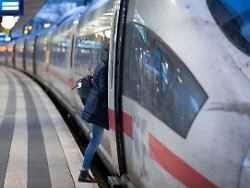The new Corona resolutions are intended to enable travelers to keep more distance on Deutsche Bahn trains. Only 60 percent of the seats should be reservable, and Deutsche Bahn wants to use more trains. However, there is still no reservation requirement.
The new corona restrictions imposed by the federal and state governments are also noticeable in Deutsche Bahn's long-distance traffic: From Friday on, passengers can only reserve one seat per double seat, as the federally owned company announced. The respective space next to it remains blocked for a reservation. In total, a maximum of 60 percent of the seats per train should be reservable. Accordingly, only diagonally opposite seats can be reserved at the tables. Travelers like families and couples can reserve seats next to each other in extra areas, as it was said. According to Deutsche Bahn, individual travelers are automatically assigned window seats if they are still free.
"From mid-December we will also be offering thousands of seats and more frequent journeys on many main routes with new trains," said Berthold Huber, Board Member for Passenger Transport. According to its own statements, the railway intends to increase the current timetable by around 10 percent. The railway is thus following the orders of the federal and state governments, which agreed on these measures on Wednesday evening to make social contacts more difficult and to further push back the corona virus.
The utilization of long-distance trains is low anyway
However, passengers can still board the train without a reservation. For the time being, the railway has got around a reservation requirement, as it appeared in the federal proposals. "We welcome the decision by the federal and state governments," said Huber. From now on only certain seats can be reserved on a train, and trains that are too full should no longer be bookable online. But if you buy a flexible ticket without a reservation, you can still sit down in the aisle seats if there is no more free window seat.
Deutsche Bahn hopes to keep capacity utilization so low with the additional timetable that such situations will only rarely occur. In the past few weeks, demand has dropped significantly again anyway. The long-distance trains are currently only used to 20 to 25 percent, according to Deutsche Bahn. In the summer after the first lockdown, it was around 30 to 40 percent. In normal times it is an average of 60 percent. The railway had always refused a reservation requirement, with which the number of passengers on the trains could possibly be better controlled. The Railway and Transport Union (EVG) doesn't believe in the idea either. She fears additional burdens for the train attendants, who would have to enforce that no passenger goes on board without a reservation.
Flexibility before reservation is required
And even the Pro Bahn passenger association is against it. "A not inconsiderable number of long-distance travelers also use this for distances in the range of approx. 50 to a good 100 kilometers," said the association. Many commuters would lose flexibility with a reservation requirement because they would no longer be able to spontaneously use long-distance transport. Pro-Bahn honorary chairman Klaus-Peter Naumann therefore considers the measures that have now been decided to be sufficient in view of the low demand. "If that works technically, that's a good thing," said Naumann.
"If suddenly significantly more travelers than expected take the train, you can always consider whether to make reservations for individual trains. We don't see any reason for that." On the other hand, Marion Jungbluth, head of the Mobility and Travel team at the Federation of German Consumer Organizations, called for improvements to the rail regulations. "The proposals are not thought through to the end and must be supplemented by goodwill regulations," she told the "Handelsblatt". Tickets that have already been purchased would have to be returned or rebooked free of charge in view of the expectation that the population would forego travel.
. (tagsToTranslate) Economy (t) Deutsche Bahn (t) Corona measures (t) Corona crisis (t) EVG
